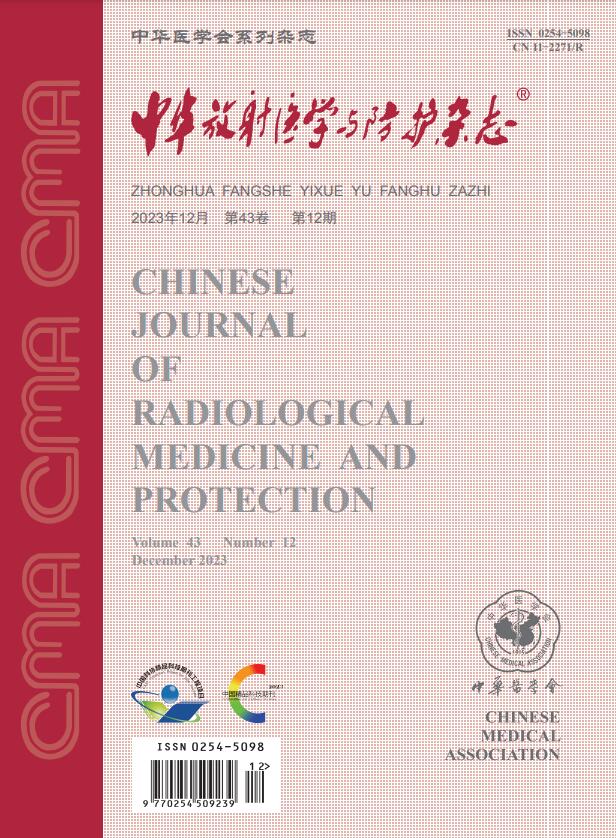Application value of the two estimation methods in evaluating the radiation dose of adult chest CT
Q4 Medicine
引用次数: 1
Abstract
Objective To investigate the application value of CTDIvol and size-specific dose estimate(SSDE) in evaluating the radiation dose of adult chest CT. Methods A retrospective analysis was made on the CTDIvoland SSDE of 128 patients who underwent chest CT scanning in the First Affiliated Hospital of Zhejiang Chinese Medical University from March to April 2017 and all images are adequate for diagnosis. The subjects were divided into three groups according to body mass index (BMI): Group A, 38 cases with 16≤BMI<21.1 kg/m2; Group B, 53 cases with 21.1≤BMI<23.9 kg/m2; Group C, 37 cases with 23.9≤BMI<34.1 kg/m2. The diameters of anterior-posterior (AP) and left-right (LAT) of each patient were measured in the slice of nipple level, and CTDIvol, effective diameter (ED), conversion factor (fsize) and SSDE of each patient were recorded and calculated. Meanwhile, the differences between CTDIvol and SSDE in different BMI groups were compared. Results SSDE of each group was higher than CTDIvol, and increased by 50.13%, 42.83% and 33.68% in group A, B and C, respectively. There were significant differences in radiation dose between CTDIvol and SSDE in the three groups (t=-48.873, -57.001, -32.651, P<0.05). There were significant differences in ED, fsize, CTDIvol and SSDE among the three groups (F=51.456, 47.749, 113.916, 106.449, P<0.05). Conclusions SSDE can evaluate the radiation dose absorbed by patients with different body types in chest CT, while CTDIvol underestimated the radiation dose.The lower BMI, the greater the underestimated dose value, the more radiation dose absorbed. Key words: Radiation dose; Chest; CT; Size-specific dose estimate两种估算方法在成人胸部CT辐射剂量评估中的应用价值
目的探讨CTDIvol和尺寸特异性剂量估算(SSDE)在成人胸部CT放射剂量评估中的应用价值。方法回顾性分析2017年3月至4月在浙江中医药大学第一附属医院行胸部CT扫描的128例患者的CTDIvoland SSDE,所有图像均可用于诊断。按体重指数(BMI)分为3组:A组,16≤BMI<21.1 kg/m2 38例;B组53例,21.1≤BMI<23.9 kg/m2;C组37例,23.9≤BMI<34.1 kg/m2。在乳头水平片上测量每位患者的前后径(AP)和左右径(LAT),记录并计算每位患者的CTDIvol、有效径(ED)、转换因子(fsize)和SSDE。同时比较不同BMI组CTDIvol和SSDE的差异。结果各组SSDE均高于CTDIvol, A、B、C组分别升高50.13%、42.83%、33.68%。三组CTDIvol与SSDE放射剂量比较,差异均有统计学意义(t=-48.873, -57.001, -32.651, P<0.05)。三组患者ED、fsize、CTDIvol、SSDE差异均有统计学意义(F=51.456、47.749、113.916、106.449,P<0.05)。结论SSDE可以评估不同体型患者在胸部CT中所吸收的辐射剂量,而CTDIvol则低估了辐射剂量。BMI越低,低估的剂量值越大,吸收的辐射剂量越大。关键词:辐射剂量;胸部;CT;尺寸特异性剂量估计
本文章由计算机程序翻译,如有差异,请以英文原文为准。
求助全文
约1分钟内获得全文
求助全文
来源期刊

中华放射医学与防护杂志
Medicine-Radiology, Nuclear Medicine and Imaging
CiteScore
0.60
自引率
0.00%
发文量
6377
期刊介绍:
 求助内容:
求助内容: 应助结果提醒方式:
应助结果提醒方式:


